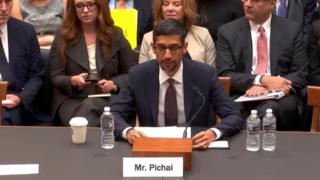Google chief denies political bias claims

Google collects “mountains” of data about users, said US politicians
Google chief Sundar Pichai has faced accusations of political bias from US politicians.
Mr Pichai was being quizzed by members of the House Judiciary Committee about the way his tech firm runs it business.
Google was accused of having “programmed” bias against conservative views into its algorithms.
Mr Pichai denied the accusation saying he had “issues” with studies that claimed to show the firm’s search results excluded right-wing views.
Privacy protection
Republican committee member Lamar Smith said conservative voices were being “muted” via Google’s search results.
“Such actions pose a grave threat to our democratic form of government,” he said.
“This does not happen by accident, it is baked in to the algorithms.”
Mr Pichai said independent studies had not uncovered any bias and added that his business was “transparent” about the way its search results were generated.
“We evaluate our studies and our research results,” said Mr Pichai.
“We have a wide variety of sources, from both left and right.”
He added that it was “impossible” for any individual or group of individuals to manipulate its algorithms.
In response to a further question about perceived bias, he said: “I’m confident we don’t approach our work with any political bias.”
He added: “It’s important that we look at outcomes and assess that there’s no evidence of bias.”
Lawmakers are also expected to raise questions about Google’s relationship with China, the data it gathers and how it deals with complaints about sexual harassment.
Mr Pichai had been under growing pressure to testify after he snubbed an earlier hearing called by the Senate Intelligence Committee.
Executives from Facebook and Twitter attended the September event where they faced tough questions.
In a document released before his testimony, Mr Pichai paid tribute to staff at Google and said it had worked to “empower people around the world, especially in the US”.
The Congressional session comes the day after the search giant announced that it was shutting down its Google+ social network.
The decision came after it found a vulnerability that could have exposed data on 52.2 million users.
